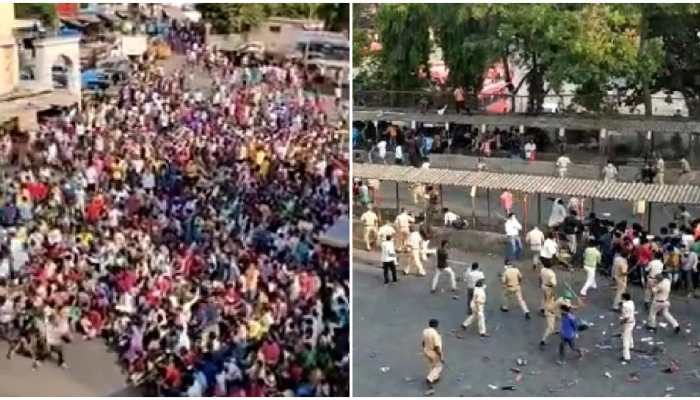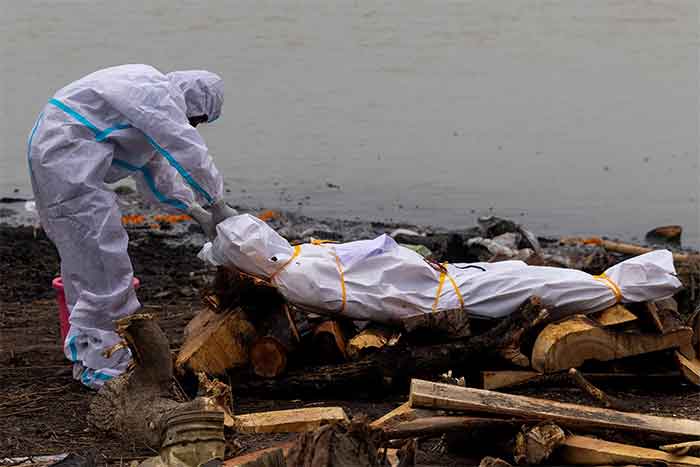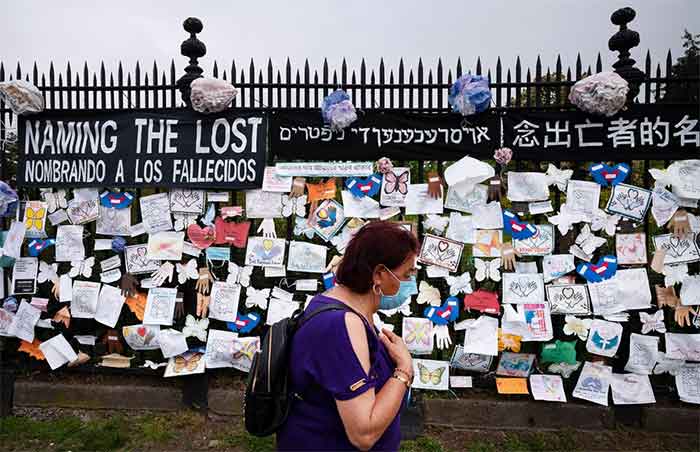Co-Written by Brishti Banerjee and Nitin Meshram

Abstract: Migrant workers from different parts of the country are stranded and pushed to vulnerable conditions as a result of the pandemic. They are walking kilometres (reverse migrating) to reach their native place, they are denied access to basic services, and every single day of the lockdown they are struggling to make both ends meet. The article elucidates the impact of COVID 19 lockdown on the lives of the migrant labour who are reduced to ‘bodies’ and refused basic ‘human’ rights.
While on one hand some of us are making the most of the lockdown by uploading images and videos of newly developed skills on social media, spending quality time with family, engaging into self-care or binge-watching series on Netflix. There are the migrant workers on the other hand who are struggling to figure out one square meal for survival!
Over a thousand migrant workers gathered outside Bandra railway station, Mumbai on Tuesday afternoon (14th April, 2020), demanding that they be sent home at the earliest as they are unable to sustain themselves during the lockdown. The result of such an action was countered by Mumbai Police, who resorted to lathi charge and dispersed them. These migrant workers said that they were tired of surviving on the kindness of strangers (The Hindu, 2020).
Migrant Workers as the ‘Distant Other’
There are several such instances where the migrant workers, mostly belonging to the unorganised sectors have taken to the roads -many started walking home carrying luggage on their heads and a few died on the road before reaching destination, protests broke out as they called for food and aid. Many of them are stuck at their work sites with dwindling supplies, little money and creeping panic and the ones who chose to go back to their native places are also stuck in transit, as the state and district borders are sealed and the public transportation system has come to a complete halt (The Economic Times, 2020). The announcement of complete lockdown, which started on 24th March, caused sudden suspension of all sorts of economic activities including complete shutdown of factories, markets, construction sites, food delivery systems all over India excluding necessary emergency services. This sudden lockdown, which included deferral of work and loss of wages made the situation very unfavourable for the survival of these daily wage labourers who in most common scenarios are migrants (Ghosh and Ray Chaudhary, 2020). The harsh realities of lockdown pose a greater threat for the migrant workers and at this juncture if Coronavirus did not kill them, hunger definitely would.
Historically, the approach of the states towards the refugees and migrants residing on their soil has been premised on ‘calculated kindness’ which is characterised by a constant ambivalence between antagonism and hospitality. These migrant workers are perceived as ‘encroachers’ or the ‘other’. They are that section of population who are ‘invisible’. Their plight in the cities happen to be acute while they struggle day and night to earn and sustain in the city. Most of them live in informal settlements which are characterised by high population density, lack of access to basic public services like water, sanitation, health and some of them continue to live in the sites where they work. These migrants face unprecedented misery added to their already precarious survival (Ghosh and Ray Chaudhary, 2020).
In a recent webinar organised by PRIA International Academy on the ‘Impact of Covid 19 Lockdown on Urban Informals in India’ Professor Amitabh Kundu discussed that as per the Census 2011 and Migration Survey data, about 68 million people migrate from one state to another, about 22 million of them are workers and around 7.5 million are casual workers who have daily wage arrangements. Another 7 million workers receive their salary on a monthly basis and they all constitute the informal sector. These groups are going to be badly affected as only 15 percent [approx.] of these migrants have been able to travel back under difficult conditions. Prior to the announcement of the lockdown the government should have facilitated a systematic process to ensure their chance to travel back to their home states or like in Delhi and Kerala should have made provision of accommodation and food for these migrants. The economic and social vulnerabilities of the marginalised economic migrants have reinforced itself in crudest manifestation, they are facing multi-layered vulnerabilities during the outbreak of the pandemic. One of the main objectives of the lockdown is to avoid death due to the virus but ironically given the migrant scenario there are now more chances of deaths due to starvation. The question here is does the state have an implementable plan of action to protect citizens from starvation?
Lack of Foresight or Deliberate Carelessness?
Despite the instruction of India’s Supreme Court stating that the migrants be treated in a humane manner. They should be provided enough food, water, beds and supplies as well as psychological counselling in shelters that are run by volunteers and not security forces -chemical disinfectants (sodium hypochlorite) was sprayed on them in the state of Uttar Pradesh, the main ingredient in that was bleach which can be dangerous to people. This incident sparked outrage online, with many turning to social media to condemn it. According to the World Health Organisation, putting disinfectant on the skin would not kill the virus if it has already entered the human body (Al Jazeera, 2020).
The overall scenario of migrant labourers is quite grim, they are reduced to mere biological bodies in the Corona pandemic as the state has deleted ‘human’ meaning from their bodies and existence. The trail of incidents suggests lack of proactive government measures to address their human concerns, this is a premature reflection of a society which has no value other than survival. The migrant labour and poor in the lockdown are not given proper human and civilised treatment either in the destination or in their home state -many migrants on returning home are faced with discrimination of carrying virus from the city! Recently in Siwan district of Bihar the migrants who managed to reach the district town of their home were put in very small space under an iron gate in very infectious conditions. They were crying and making appeals for rescue the whole night and were rescued the next day. They are looked at as unclean bodies suspected of carrying virus (Tiwari, 2020).
The Policy Response
On 27th March, Honorable Finance Minister Nirmala Sitharaman announced the economic package of 1.70 lakh crore Pradhan Mantri Garib Kalyan Yojana to help deal with COVID – 19. Some of the key elements of the package includes in-kind (food and cooking gas) and cash transfers to lower-income households; insurance coverage for workers in the healthcare sector; and wage support to low-wage workers (in some cases for those still working, and in other cases by easing the criteria for receiving benefits in the event of job loss). The Government has taken steps to use the stocks and have started providing PDS provision of 5 kg per person per month for the coming three months. However, it is quite likely that three months will not be enough. Even if the lockdown ends soon, the process of reopening the economy will take time. More importantly, a substantial fraction of the poor (which includes the migrants) are excluded from the PDS rolls, for one reason or another (such as identification barriers to get a ration card that turn out to be hard to overcome), and this supplementary provision only applies to those who are already on it. There are also pending applications for the ration cards and the correct response to these is to issue temporary ration cards at least for six months with minimum or no legal entitlement to produce (Sen, Rajan and Banerjee, 2020).
Most vulnerable are those who are migrants and do not possess the ration card and they are left out of the PDS. There is a dire need to ensure ration for the migrants who are homeless, living in low income settlements as well as on rental housing. Starvation is just one of the worries of the Government, even if the meals are secured for now the next comes the unexpected loss of income and livelihoods. The government has partly recognized this in cash transfers for certain groups. However, the amounts are small for instance under MNREGA pay out has been increased to 202 INR per day from 182 INR per day.
Concluding Remarks
Migrant workers constitute a large part of the informal sector of India’s economy and yet lack clear legal protection. It is high time that the State to realise the rising strong link between work and poverty and the crucial role the working poor, which largely includes the migrant labour, play in the functioning of the larger economy. Therefore, alongside the need to spend wisely given the enormous likely demand for fiscal resources in the coming months, it is imperative upon the government to specifically look into protection and security of the vulnerable.
Here are few (out of many) recommendations in this regard. First and foremost, free distribution of ration to all ration card holders eligible for subsidised food and also to those who do not possess legal entitlements (working poor, non-working poor, and vulnerable sections of the society). A systematic distribution mechanism should be set up in this regard which must include effective monitoring and supervision of PDS shops to ensure beneficiaries get the ration. Secondly, temporary shelter arrangements should be provided especially in government buildings, schools, offices etc. For example, the state of Kerala initiated a novel scheme to shelter the migrant workers who were stuck. They opened 4,603 relief camps that house 144,145 migrant workers. Another 35 camps were set up for 1,545 homeless and destitute. Food, masks, soaps and other items were also made available to them (Bhattacharjee and Sarkar, 2020). Additionally, certain measures to provide cooked food have been taken by the Municipal Corporation of Greater Mumbai (MCGM) and Nagpur Municipal Corporation (NMC) as well. Thirdly, the states should collaborate with local civil society organisations, volunteers and give more autonomy to the local administration for providing effective relief to the most vulnerable. Fourthly, as Dr. Gautam Bhan suggests small loop interventions which indicates a localised solution where a cash transfer for example, a rent can be made from a small local fund to a landlord so as to prevent an eviction or rent based displacement, especially for workers who decided to walk back home, most of them fear evictions and not being able to pay rent. Fifthly, there is a need to consider novel solutions and for that to happen emphasis should be on local or granular data which can be a way to recognise and acknowledge informality. Lastly, basic services should not be denied and not under any scenario should the human rights of the vulnerable section of population be violated.
References
- Al Jazeera. (2020, April). Indian Migrant Workers Sprayed with Disinfectant Chemical. Al Jazeera. Retrieved from https://www.aljazeera.com/programmes/newsfeed/2020/04/indian-migrant-workers-sprayed-disinfectant-chemical-200406104936658.html
- Bhattacharjee and Sarkar (2020). Borders of an Epidemic: Covid-19 and Migrant Workers. Kolkata, West Bengal: Mahanirban Calcutta Research Group, pg: 132-138
- Ghosh and Ray Chaudhary (2020). Borders of an Epidemic: Covid-19 and Migrant Workers. Kolkata, West Bengal: Mahanirban Calcutta Research Group, pg: 91-98.
- (2020, April 11). Miseries of migrant labourers worsen amid coronavirus pandemic and lockdown. The Economic Times. Retrieved from https://economictimes.indiatimes.com/news/politics-and-nation/miseries-of-migrant-labourers-worsen-amid-coronavirus-pandemic-and-lockdown/articleshow/75099573.cms
- Sharma, M. S. (2020, March 27). The Good and Ugly of the Government’s Economic Package. NDTV. Retrieved from https://www.ndtv.com/opinion/the-good-and-ugly-of-the-governments-economic-package-2201697
- Sen, A., Rajan, R., & Banerjee, A. (2020, April 16). A long haul, spend wisely, but don’t skimp on the truly needy. Retrieved April 16, 2020, from https://indianexpress.com/article/opinion/coronavirus-india-lockdown-economy-amartya-sen-raghuram-rajan-abhijit-banerjee-6364521/
- Tiwari (2020). Borders of an Epidemic: Covid-19 and Migrant Workers. Kolkata, West Bengal: Mahanirban Calcutta Research Group, pg: 40-48.
- The Hindu. (2020, April 14). Coronavirus | Migrant workers protest outside Bandra railway station. The Hindu. Retrieved from https://www.thehindu.com/news/cities/mumbai/coronavirus-migrant-workers-protest-outside-bandra-railway-station-demand-help-to-return-home/article31341724.ece
- UN News. (2020, April 2). India: Migrant workers’ plight prompts UN call for ‘domestic solidarity’ in coronavirus battle. UN News. Retrieved from https://news.un.org/en/story/2020/04/1060922
Brishti Banerjee and Nitin Meshram are urban practitioners working on issues of habitat and informal labour. They are also the alumni of Tata Institute of Social Sciences, Mumbai.
SIGN UP FOR COUNTERCURRENTS DAILY NEWS LETTER

















































